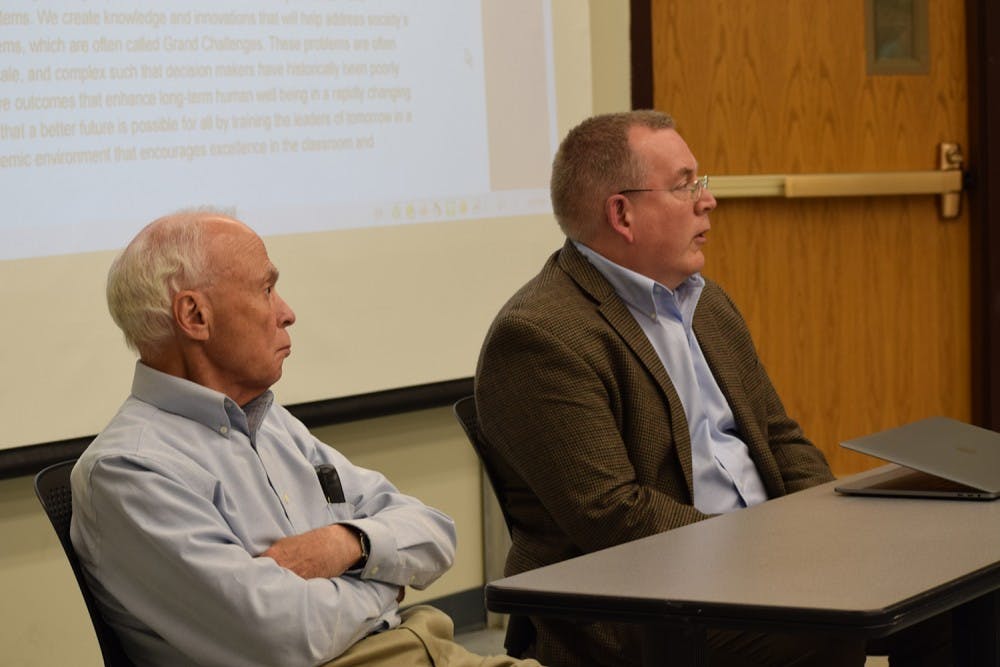The Systems and Informations Engineering department held a discussion in Olsson Hall Wednesday afternoon to gauge undergraduate student opinion of a potential merger with the Civil and Environmental Engineering department. The room was filled, with roughly 75 students in attendance, and most students who spoke out during the meeting were against the merger.
The discussion was led by Systems Prof. and Department Chair Barry Horowitz and Assoc. Systems Prof. Peter Beling, and was conducted in a question-and-answer format.
Beling opened the discussion by explaining the reasons for the proposed merger, which included a desire to see the Engineering School rise in national rankings as well as to create an increased emphasis on research at the University.
“It’s really a concept that’s been driven by a desire to improve the school, improve the rankings of the programs in the school and the departments in the school,” Beling said. “It’s primarily driven by the opportunity to see an improvement in the research standing of the School of Engineering as a whole and of the individual departments in the school.”
Beling said Systems and Civil Engineering are moving in the same direction.
“When we thought about who was moving in the same direction within the School of Engineering, we came to the conclusion … that the closest department to us in terms of this same kind of vision is CEE,” Beling said. “CEE shares a couple of things in common with us in sort of an abstract level. One is the trends are all the same for them. What’s happening in the world of civil engineering, environmental engineering is all moving in the systems direction.”
After laying out his reasons for the merge, Beling then opened the floor up to questions and comments. Student opinion was overwhelmingly opposed to the merge.
Several students voiced concerns about the quality of teaching decreasing if the new department places an increased emphasis on research.
“The overall worry is not the process, but it’s more of we value our undergraduate education,” fourth-year Systems Engineering student Jeannie Blackwood said in an interview with The Cavalier Daily. “And we know that when you bring in the best researchers, you’re not bringing in the best professors. Our favorite professors are teaching professors.”
Beling said the merge would not change the academic experience of current Systems students, and that he could not see the academic experience of students being negatively affected.
“We have no plans, none at all, to change the degree program,” Beling said. “If we can get more folks in the department, we’ll have more resources in terms of faculty, so we can do more stuff. I can imagine the positive things that can come from more bodies, but I can’t see the negative effects on you.”
However, several students, both undergraduate and graduate, mentioned a concern about their ability to get jobs if they graduate from a department with a different name from Systems.
“Even if the exact name on our degree doesn’t change, as they said in the meeting that it wouldn’t, it still gives more emphasis to a civil side that almost none of us are working on,” Systems Engineering graduate student Emily Miller said. “People are uncomfortable being in a department with that slant that they didn’t know about when they agreed to come here.”
Systems Engineering graduate student Faraz Dadgostari said he was concerned about the different name as well.
“All problems come down to … changing the name of the department,” Dadgostari said. “It’s going to appear on degrees, it’s going to appear on websites. It can really affect our opportunities to publish in conferences, to get fellowships, to get funding, to get faculty positions.”
Students also raised concerns about not being consulted about the potential merger earlier. Blackwood said she was not officially notified of the merger until this weekend, when she received an email about the Wednesday discussion.
But Horowitz said the late notification was due to the fact that there wasn’t much to say until just recently, as the faculty was still planning the merger.
“We wanted to wait until we felt ready,” Horowitz said. “We started planning this in January, and we’re only now at the point that we got to today. And even that is still not faculty-agreed-upon and being argued about.”
Maite Brandt-Pearce, executive associate dean for Academic Affairs, said Engineering School Dean Craig Benson will ultimately decide whether to merge the Systems and Civil Engineering departments. But even his decision, Brandt-Pearce said, is subject to the decision of the provost.
Several students emphasized not feeling included in the decision process.
“I think what we found out today in this discussion is that students need to be involved in any decisions that relate to the education,” fourth-year Civil Engineering student Jeremy Baruch said. “Where it’s on principle not a bad idea, every [decision] needs to be passed through a joint faculty and student committee and have advice from everyone who’s going to be affected.”
Blackwood said she didn’t feel like students and faculty were adequately consulted about the decision.
“Jefferson’s institution is supposed to be built on self-government and self-research,” Blackwood said. “And they did not put any of us in the decision for that to be made.”
There will be a Systems faculty meeting Thursday to discuss the merger.







